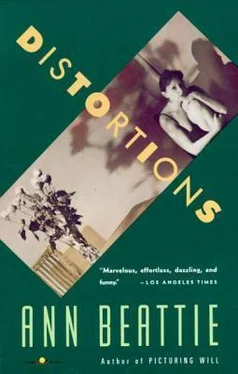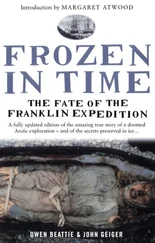Ann Beattie - Distortions
Здесь есть возможность читать онлайн «Ann Beattie - Distortions» весь текст электронной книги совершенно бесплатно (целиком полную версию без сокращений). В некоторых случаях можно слушать аудио, скачать через торрент в формате fb2 и присутствует краткое содержание. Год выпуска: 1991, Издательство: Vintage, Жанр: Современная проза, на английском языке. Описание произведения, (предисловие) а так же отзывы посетителей доступны на портале библиотеки ЛибКат.
- Название:Distortions
- Автор:
- Издательство:Vintage
- Жанр:
- Год:1991
- ISBN:нет данных
- Рейтинг книги:5 / 5. Голосов: 1
-
Избранное:Добавить в избранное
- Отзывы:
-
Ваша оценка:
- 100
- 1
- 2
- 3
- 4
- 5
Distortions: краткое содержание, описание и аннотация
Предлагаем к чтению аннотацию, описание, краткое содержание или предисловие (зависит от того, что написал сам автор книги «Distortions»). Если вы не нашли необходимую информацию о книге — напишите в комментариях, мы постараемся отыскать её.
Distortions — читать онлайн бесплатно полную книгу (весь текст) целиком
Ниже представлен текст книги, разбитый по страницам. Система сохранения места последней прочитанной страницы, позволяет с удобством читать онлайн бесплатно книгу «Distortions», без необходимости каждый раз заново искать на чём Вы остановились. Поставьте закладку, и сможете в любой момент перейти на страницу, на которой закончили чтение.
Интервал:
Закладка:
“No,” he says. “All out.”
They ride in silence.
“You could go to a palmist,” he says after a while. “They’ll tell you what’s up.”
“A palmist? Really?”
“Well, I don’t know. If you believe half they say …”
“You don’t believe them?”
“Well, I fool around with stuff like this, but I sort of pay attention to what I like and forget what I don’t like. The horoscope told me to delay travel yesterday, and I did.”
“Why don’t you believe them?” Cynthia asks.
“Oh, I think most of them don’t know any more than you or me.”
“Then let’s do it as a game,” she says. “I’ll ask questions, and you give the answer.”
Peter laughs. “O.K.,” he says. He lifts her hand from her lap and stares hard at it. He turns it over and examines the other side, frowning.
“Should I marry Charlie?” she whispers.
“I see …” he begins. “I see a man. I see a man … in the drinking car.”
“But what am I going to do?” she whispers. “Should I marry him?”
Peter gazes intently at her palm, then smooths his fingers down hers. “Maybe,” he says gravely when he reaches her fingertips.
Delighted with his performance, he cracks up. A woman in the seat in front of them peers over the back of her chair to see what the noise is about. She sees a hippie holding a fat woman’s hand and drinking from a flask.
“Coleridge,” Peter is saying. “You know — Coleridge, the poet? Well, he says that we don’t, for instance, dream about a wolf and then get scared. He says it’s that we’re scared to begin with, see, and therefore we dream about a wolf.”
Cynthia begins to understand, but then she loses it. It is the fault of the sleeping pill and many drinks. In fact, when Charlie comes back, Cynthia is asleep on Peter’s shoulder. There is a scene — or as much of a scene as a quiet man like Charlie can make. Charlie is also drunk, which makes him mellow instead of really angry. Eventually, brooding, he sits down across the aisle. Late that night, when the train slows down for the Georgia station, he gazes out the window as if he noticed nothing. Peter helps Cynthia get her bag down. The train has stopped at the station, and Charlie is still sitting, staring out the window at a few lights that shine along the tracks. Without looking at him, without knowing what will happen, Cynthia walks down the aisle. She is the last one off. She is the last one off before the train pulls out, with Charlie still on it.
Her parents watch the train go down the track, looking as if they are visitors from an earlier century, amazed by such a machine. They had expected Charlie, of course, but now they have Cynthia. They were not prepared to be pleasant, and there is a strained silence as the three watch the train disappear.
That night, lying in the bed she slept in as a child, Cynthia can’t sleep. She gets up, finally, and sits in the kitchen at the table. What am I trying to think about, she wonders, closing her hands over her face for deeper concentration. It is cold in the kitchen, and she is not so much hungry as empty. Not in the head, she feels like shouting to Lincoln, but in the stomach — somewhere inside. She clasps her hands in front of her, over her stomach. Her eyes are closed. A picture comes to her — a high, white mountain. She isn’t on it, or in the picture at all. When she opens her eyes she is looking at the shiny surface of the table. She closes her eyes and sees the snow-covered mountain again — high and white, no trees, just mountain — and she shivers with the coldness of it.
Wanda’s


When May’s mother went to find her father, May was left with her Aunt Wanda. She wasn’t really an aunt; she was a friend of her mother’s who ran a boardinghouse. Wanda called it a boardinghouse, but she rarely accepted boarders. There was only one boarder, who had been there six years. May had stayed there twice before. The first time was when she was nine, and her mother left to find her father, Ray, who had gone to the West Coast and had vacationed too long in Laguna Beach. The second time was when her mother was hung over and had to have “a little rest,” and she left May there for two days. The first time, she left her for almost two weeks, and May was so happy when her mother came back that she cried. “Where did you think Laguna Beach was?” her mother said. “A hop, skip, and a jump? Honey, Laguna Beach is practically across the world.”
The only thing interesting about Wanda’s is her boarder, Mrs. Wong. Mrs. Wong once gave May a little octagonal box full of pastel paper circles that spread out into flowers when they were dropped in water. Mrs. Wong let her drop them in her fishbowl. The only fish in the fishbowl is made of bright-orange plastic and is suspended in the middle of the bowl by a sinker. There are many brightly colored things in Mrs. Wong’s room, and May is allowed to touch all of them. On her door Mrs. Wong has a little heart-shaped piece of paper with “Ms. Wong” printed on it.
Wanda is in the kitchen, talking to May. “Eggs don’t have many calories, but if you eat eggs the cholesterol kills you,” Wanda says. “If you eat sauerkraut there’s not many calories, but there’s a lot of sodium, and that’s bad for the heart. Tuna fish is full of mercury — what’s that going to do to a person? Who can live on chicken? You know enough, there’s nothing for you to eat.”
Wanda takes a hair clip out of her pants pocket and clips back her bangs. She puts May’s lunch in front of her — a bowl of tomato soup and a slice of lemon meringue pie. She puts a glass of milk next to the soup bowl.
“They say that after a certain age milk is no good for you — you might as well drink poison,” she says. “Then you read somewhere else that Americans don’t have enough milk in their diet. I don’t know. You decide what you want to do about your milk, May.”
Wanda sits down, lights a cigarette, and drops the match on the floor.
“Your dad really picks swell times to disappear. The hot months come, and men go mad. What do you think your dad’s doing in Denver, honey?”
May shrugs, blows on her soup.
“How do you know, huh?” Wanda says. “I ask dumb questions. I’m not used to having kids around.” She bends to pick up the match. The tops of her arms are very fat. There are little bumps all over them.
“I got married when I was fifteen,” Wanda says. “Your mother got married when she was eighteen — she had three years on me — and what’s she do but drive all around the country rounding up your dad? I was twenty-one the second time I got married, and that would have worked out fine if he hadn’t died.”
Wanda goes to the refrigerator and gets out the lemonade. She swirls the container. “Shaking bruises it,” she says, making a joke. She pours some lemonade and tequila into a glass and takes a long drink.
“You think I talk to you too much?” Wanda says. “I listen to myself and it seems like I’m not really conversing with you — like I’m a teacher or something.”
May shakes her head sideways.
“Yeah, well, you’re polite. You’re a nice kid. Don’t get married until you’re twenty-one. How old are you now?”
“Twelve,” May says.
After lunch, May goes to the front porch and sits in the white rocker. She looks at her watch — a present from her father — and sees that one of the hands is straight up, the other straight down, between the Road-Runner’s legs. It is twelve-thirty. In four and a half hours she and Wanda will eat again. At Wanda’s they eat at nine, twelve, and five. Wanda worries that May isn’t getting enough to eat. Actually, she is always full. She never feels like eating. Wanda eats almost constantly. She usually eats bananas and Bit-O-Honey candy bars, which she carries in her shirt pocket. The shirt belonged to her second husband, who drowned. May found out about him a few days ago. At night, Wanda always comes into her bedroom to tuck her in. Wanda calls it tucking in, but actually she only walks around the room and then sits at the foot of the bed and talks. One of the stories she told was about her second husband, Frank. He and Wanda were on vacation, and late at night they sneaked onto a fishing pier. Wanda was looking at the lights of a boat far in the distance when she heard a splash. Frank had jumped into the water. “I’m cooling off!” Frank hollered. They had been drinking, so Wanda just stood there laughing. Then Frank started swimming. He swam out of sight, and Wanda stood there at the end of the pier waiting for him to swim back. Finally she started calling his name. She called him by his full name. “Frank Marshall!” she screamed at the top of her lungs. Wanda is sure that Frank never meant to drown. They had been very happy at dinner that night. He had bought her brandy after dinner, which he never did, because it was too expensive to drink anything but beer in restaurants.
Читать дальшеИнтервал:
Закладка:
Похожие книги на «Distortions»
Представляем Вашему вниманию похожие книги на «Distortions» списком для выбора. Мы отобрали схожую по названию и смыслу литературу в надежде предоставить читателям больше вариантов отыскать новые, интересные, ещё непрочитанные произведения.
Обсуждение, отзывы о книге «Distortions» и просто собственные мнения читателей. Оставьте ваши комментарии, напишите, что Вы думаете о произведении, его смысле или главных героях. Укажите что конкретно понравилось, а что нет, и почему Вы так считаете.












